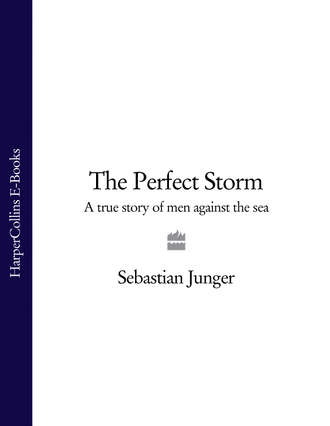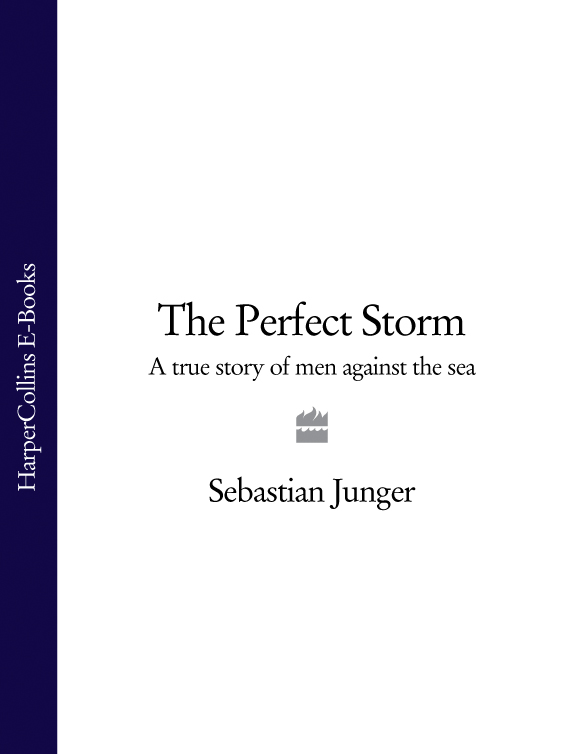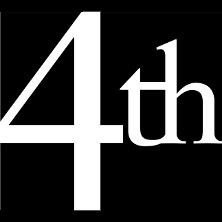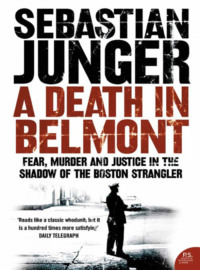
Полная версия
The Perfect Storm: A True Story of Men Against the Sea


SEBASTIAN JUNGER
The Perfect Storm
A True Story of Man Against the Sea


Copyright
Fourth Estate
An imprint of HarperCollinsPublishers Ltd. 1 London Bridge Street London SE1 9GF
www.harpercollins.co.uk
First published in Great Britain in 1997 by Fourth Estate Limited
Copyright © Sebastian Junger 1997
PS Section © Harper Perennial 2006, except ‘Watching the Storm’ by Lucy Miller © Express 2000
PS™ is a trademark of HarperCollinsPublishers Ltd
Sebastian Junger asserts the moral right to be identified as the author of this work
A catalogue record for this book is available from the British Library
All rights reserved under International and Pan-American Copyright Conventions. By payment of the required fees, you have been granted the non-exclusive, non-transferable right to access and read the text of this ebook on-screen. No part of this text may be reproduced, transmitted, down-loaded, decompiled, reverse engineered, or stored in or introduced into any information storage and retrieval system, in any form or by any means, whether electronic or mechanical, now known or hereinafter invented, without the express written permission of HarperCollins ebooks
HarperCollinsPublishers has made every reasonable effort to ensure that any picture content and written content in this ebook has been included or removed in accordance with the contractual and technological constraints in operation at the time of publication
Source ISBN: 9780007230068
Ebook Edition © AUGUST 2010 ISBN: 9780007324385 Version: 2017-08-22
PRAISE
‘If one knows anything at all about the sea, one feels the enormous strengths of the hurricane winds and the incredibly towering mass of the hundred-foot waves’
PATRICK O’BRIAN
‘Sebastian Jungers compassionate, intelligent voice instructs us effortlessly on the sea life of the swordfisherman, the physics of a sinking steel ship, and the details of death by drowning. It is a terrifying read’
DAVA SOBEL
‘Junger moves seamlessly between the wrenching human dramas and the awesome details of the storm. The Perfect Storm is terrifying, sad, exhilarating, humbling and unforgettable’
Daily Mail
‘Junger has found a language to match the stature of the sea at its worst, and to capture its mysteries … it’s a chilling account that registers 12 on the Beaufort Scale’
Sunday Times
‘A magnificent sea yarn … but a true story and all the more compelling for hat’
Observer
‘Cuts every facet of raw material to flashing brilliance … It amounts to a Homeric epic in its control of overwhelming natural forces and the grim demands they make of human life and effort’
Scotland on Sunday
‘The closest you will come to drowning at sea without actually having to do so’
The Times
‘Sometimes a story comes along that’s almost too good to be believable. The Perfect Storm may read like a novel but it isn’t one. It’s chillingly true … more fabulous than fiction, it will become a classic for a jaded modern world’
Independent
‘Masterly, an essay in fear … He writes like a poet who has been to meteorology school’
RUTH RENDELL, Daily Telegraph
‘Reading The Perfect Storm is like trawling back through every watery dream, and nightmare, you have ever had. It confirms your wildest hopes of quiet heroism as well as your greatest fears’
Independent
Puts the reader in the eye of the storm and into the hearts and minds of all those whose lives were lost or hearts seared by the disaster … the result is total authenticity and perhaps the best writing since Moby Dick on the awesome power, terror and grandeur of the sea and on the character of the people who confront it’
Lloyds List
’ tour de force of descriptive writing … simultaneously thrilling and sobering’
Financial Times
DEDICATION
THIS BOOK IS DEDICATED
TO MY FATHER, WHO
FIRST INTRODUCED ME
TO THE SEA.
CONTENTS
COVER
TITLE PAGE
COPYRIGHT
PRAISE
DEDICATION
FOREWORD
GEORGES BANK, 1896
GLOUCESTER, MASS., 1991
GOD’S COUNTRY
THE FLEMISH CAP
THE BARREL OF THE GUN
GRAVEYARD OF THE ATLANTIC
THE ZERO-MOMENT POINT
THE WORLD OF THE LIVING
INTO THE ABYSS
THE DREAMS OF THE DEAD
AFTERWORD
KEEP READING
ACKNOWLEDGMENTS
P.S. IDEAS, INTERVIEWS & FEATURES …
ABOUT THE AUTHOR
ABOUT THE BOOK
READ ON
ABOUT THE AUTHOR
BY THE SAME AUTHOR
ABOUT THE PUBLISHER
FOREWORD
RECREATING the last days of six men who disappeared at sea presented some obvious problems for me. On the one hand, I wanted to write a completely factual book that would stand on its own as a piece of journalism. On the other hand, I didn’t want the narrative to asphyxiate under a mass of technical detail and conjecture. I toyed with the idea of fictionalizing minor parts of the story—conversations, personal thoughts, day-to-day routines—to make it more readable, but that risked diminishing the value of whatever facts I was able to determine. In the end I wound up sticking strictly to the facts, but in as wide-ranging a way as possible. If I didn’t know exactly what happened aboard the doomed boat, for example, I would interview people who had been through similar situations, and survived. Their experiences, I felt, would provide a fairly good description of what the six men on the Andrea Gail had gone through, and said, and perhaps even felt.
As a result, there are varying kinds of information in the book. Anything in direct quotes was recorded by me in a formal interview, either in person or on the telephone, and was altered as little as possible for grammar and clarity. All dialogue is based on the recollection of people who are still alive, and appears in dialogue form without quotation marks. No dialogue was made up. Radio conversations are also based on peoples recollections, and appear in italics in the text. Quotes from published material are in italics, and have occasionally been condensed to better fit the text. Technical discussions of meteorology, wave motion, ship stability, etc., are based on my own library research and are generally not referenced, but I feel compelled to recommend William Van Dorn’s The Oceanography of Seamanship as a comprehensive and immensely readable text on ships and the sea.
In short, I’ve written as complete an account as possible of something that can never be fully known. It is exactly that unknowable element, however, that has made it an interesting book to write and, I hope, to read. I had some misgivings about calling it The Perfect Storm, but in the end I decided that the intent was sufficiently clear. I use perfect in the meteorological sense: a storm that could not possibly have been worse. I certainly mean no disrespect to the men who died at sea or the people who still grieve them.
My own experience in the storm was limited to standing on Gloucester’s Back Shore watching thirty-foot swells advance on Cape Ann, but that was all it took. The next day I read in the paper that a Gloucester boat was feared lost at sea, and I clipped the article and stuck it in a drawer. Without even knowing it, I had begun to write The Perfect Storm.
GEORGES BANK, 1896
ONE mid-winter day off the coast of Massachusetts, the crew of a mackerel schooner spotted a bottle with a note in it. The schooner was on Georges Bank, one of the most dangerous fishing grounds in the world, and a bottle with a note in it was a dire sign indeed. A deckhand scooped it out of the water, the sea grass was stripped away, and the captain uncorked the bottle and turned to his assembled crew: “On Georges Bank with our cable gone our rudder gone and leaking. Two men have been swept away and all hands have been given up as our cable is gone and our rudder is gone. The one that picks this up let it be known. God have mercy on us.”
The note was from the Falcon, a boat that had set sail from Gloucester the year before. She hadn’t been heard from since. A boat that parts her cable off Georges careens helplessly along until she fetches up in some shallow water and gets pounded to pieces by the surf. One of the Falcon s’ crew must have wedged himself against a bunk in the fo‘c’sle and written furiously beneath the heaving light of a storm lantern. This was the end, and everyone on the boat would have known it. How do men act on a sinking ship? Do they hold each other? Do they pass around the whisky? Do they cry?
This man wrote; he put down on a scrap of paper the last moments of twenty men in this world. Then he corked the bottle and threw it overboard. There’s not a chance in hell, he must have thought. And then he went below again. He breathed in deep. He tried to calm himself. He readied himself for the first shock of sea.
GLOUCESTER, MASS., 1991
It’s no fish ye’re buying, it’s men’s lives.
—SIR WALTER SCOTT
The Antiquary, Chapter 11
A SOFT fall rain slips down through the trees and the smell of ocean is so strong that it can almost be licked off the air.
Trucks rumble along Rogers Street and men in t-shirts stained with fishblood shout to each other from the decks of boats. Beneath them the ocean swells up against the black pilings and sucks back down to the barnacles. Beer cans and old pieces of styrofoam rise and fall and pools of spilled diesel fuel undulate like huge iridescent jellyfish. The boats rock and creak against their ropes and seagulls complain and hunker down and complain some more. Across Rogers Street and around the back of the Crow’s Nest Inn, through the door and up the cement stairs, down the carpeted hallway and into one of the doors on the left, stretched out on a double bed in room #27 with a sheet pulled over him, Bobby Shatford lies asleep.
He’s got one black eye. There are beer cans and food wrappers scattered around the room and a duffel bag on the floor with t-shirts and flannel shirts and blue jeans spilling out.Lying asleep next to him is his girlfriend, Christina Cotter. She’s an attractive woman in her early forties with rust-blond hair and a strong, narrow face. There’s a T.V. in the room and a low chest of drawers with a mirror on top of it and a chair of the sort they have in high-school cafeterias. The plastic cushion cover has cigarette burns in it. The window looks out on Rogers Street where trucks ease themselves into fish-plant bays.
It’s still raining. Across the street is Rose Marine, where fishing boats fuel up, and across a small leg of water is the State Fish Pier, where they unload their catch. The State Pier is essentially a huge parking lot on pilings, and on the far side, across another leg of water, is a boatyard and a small park where mothers bring their children to play. Looking over the park on the corner of Haskell Street is an elegant brick house built by the famous Boston architect, Charles Bulfinch. It originally stood on the corner of Washington and Summer Streets in Boston, but in 1850 it was jacked up, rolled onto a barge, and transported to Gloucester. That is where Bobby’s mother, Ethel, raised four sons and two daughters. For the past fourteen years she has been a daytime bartender at the Crow’s Nest. Ethel’s grandfather was a fisherman and both her daughters dated fishermen and all four of the sons fished at one point or another. Most of them still do.
The Crow’s Nest windows face east into the coming day over a street used at dawn by reefer trucks. Guests don’t tend to sleep late. Around eight o’clock in the morning, Bobby Shatford struggles awake. He has flax-brown hair, hollow cheeks, and a sinewy build that has seen a lot of work. In a few hours he’s due on a swordfishing boat named the Andrea Gail, which is headed on a one-month trip to the Grand Banks. He could return with five thousand dollars in his pocket or he could not return at all. Outside, the rain drips on. Chris groans, opens her eyes, and squints up at him. One of Bobby’s eyes is the color of an overripe plum.
Did I do that?
Yeah.
Jesus.
She considers his eye for a moment. How did I reach that high?
They smoke a cigarette and then pull on their clothes and grope their way downstairs. A metal fire door opens onto a back alley, they push it open and walk around to the Rogers Street entrance. The Crow’s Nest is a block-long faux-Tudor construction across from the J. B. Wright Fish Company and Rose Marine. The plate-glass window in front is said to be the biggest barroom window in town. That’s quite a distinction in a town where barroom windows are made small so that patrons don’t get thrown through them. There’s an old pool table, a pay phone by the door, and a horseshoe-shaped bar. Budweiser costs a dollar seventy-five, but as often as not there’s a fisherman just in from a trip who’s buying for the whole house. Money flows through a fisherman like water through a fishing net; one regular ran up a $4,000 tab in a week.
Bobby and Chris walk in and look around. Ethel’s behind the bar, and a couple of the town’s earlier risers are already gripping bottles of beer. A shipmate of Bobby’s named Bugsy Moran is seated at the bar, a little dazed. Rough night, huh? Bobby says. Bugsy grunts. His real name is Michael. He’s got wild long hair and a crazy reputation and everyone in town loves him. Chris invites him to join them for breakfast and Bugsy slides off his stool and follows them out the door into the light rain. They climb into Chris’s 20-year-old Volvo and drive down to the White Hen Pantry and shuffle in, eyes bloodshot, heads throbbing. They buy sandwiches and cheap sunglasses and then they make their way out into the unrelenting greyness of the day. Chris drives them back to the Nest and they pick up 30-year-old Dale Murphy, another crew member from the Andrea Gail, and head out of town.
Dale’s nickname is Murph, he’s a big grizzly bear of a guy from Bradenton Beach, Florida. He has shaggy black hair, a thin beard, and angled, almost Mongolian eyes; he gets a lot of looks around town. He has a three-year-old baby, also named Dale, whom he openly adores. His ex-wife, Debra, was three-time Southwestern Florida Women’s boxing champion and by all rights, young Dale is going to be a bruiser. Murph wants to get him some toys before he leaves, and Chris takes the three men to the shopping center out by Good Harbor Beach. They go into the Ames and Bobby and Bugsy get extra thermals and sweats for the trip and Murph walks down the aisles, filling a cart with Tonka trucks and firemen’s helmets and ray guns. When he can’t fit any more in he pays for it, and they all pile into the car and drive back to the Nest. Murph gets out and the other three decide to drive around the corner to the Green Tavern for another drink.
The Green Tavern looks like a smaller version of the Nest, all brick and false timber. Across the street is a bar called Bill’s; the three bars form the Bermuda Triangle of downtown Gloucester. Chris and Bugsy and Bobby walk in and seat themselves at the bar and order a round of beers. The television’s going and they watch it idly and talk about the trip and the last night of craziness at the Nest. Their hangovers are starting to soften. They drink another round and maybe half an hour goes by and finally Bobby’s sister Mary Anne walks in. She’s a tall blonde who inspires crushes in the teenaged sons of some of her friends, but there’s a certain no-nonsense air about her that has always kept Bobby on his toes. Oh shit, here she comes, he whispers.
He hides his beer behind his arm and pulls the sunglasses down over his black eye. Mary Anne walks up. What do you think I am, stupid? she asks. Bobby pulls the beer out from hiding. She looks at his eye. Nice one, she says.
I was in a riff downtown. Right.
Someone buys her a wine cooler and she takes a couple of sips. I just came to make sure you were getting on the boat, she says. You shouldn’t be drinking so early in the day.
Bobby’s a big, rugged kid. He was sickly as a child—he had a twin who died a few weeks after birth—but as he got older he got stronger and stronger. He used to play tackle football in pick-up games where broken bones were a weekly occurrence. In his jeans and hooded sweatshirt he looks like such a typical fisherman that a photographer once took a picture of him for a postcard of the waterfront; but still, Mary Anne’s his older sister, and he’s in no position to contradict her.
Chris loves you, he says suddenly. I do, too.
Mary Anne isn’t sure how to react. She’s been angry at Chris lately—because of the drinking, because of the black eye—but Bobby’s candor has thrown her off. He’s never said anything like that to her before. She stays long enough to finish her wine cooler and then heads out the door.
THE first time Chris Cotter saw the Crow’s Nest she swore she’d never go in; it just looked too far down some road in life she didn’t want to be on. She happened to be friends with Mary Anne Shatford, however, and one day Mary Anne dragged her through the heavy wooden door and introduced her around. It was a fine place: people bought drinks for each other like they said hello and Ethel cooked up a big pot of fish chowder from time to time, and before Chris knew it she was a regular. One night she noticed a tall young man looking at her and she waited for him to come over, but he never did. He had a taut, angular face, square shoulders, and a shy cast to his eyes that made her think of Bob Dylan. The eyes alone were enough. He kept looking at her but wouldn’t come over, and finally he started heading for the door.
Where are you goin’? she said, blocking his way.
To the Mariner.
The Irish Mariner was next door and in Chris’s mind it was really down the road to hell. I’m not crossin’ over, thought Chris, I’m in the Nest and that’s enough, the Mariner’s the bottom of the bucket. And so Bobby Shatford walked out of her life for a month or so. She didn’t see him again until New Year’s Eve.
“I’m in the Nest,” she says, “and he’s across the bar and the place is packed and insane and it’s gettin’ near the twelve o’clock thing and finally Bobby and I talk and go over to another party. I hung with Bobby, and I did, I brought him home and we did our thing, our drunken thing and I remember waking up the next morning and looking at him and thinking, Oh my God this is a nice man what have I done? I told him, You gotta get out of here before my kids wake up, and after that he started callin’ me.”
Chris was divorced and had three children and Bobby was separated and had two. He was bartending and fishing to pay off a child-support debt and splitting his time between Haskell Street and his room above the Nest. (There are a dozen or so rooms available, and they’re very cheap if you know the right person. Like your mother, the bartender.) Soon Chris and Bobby were spending every minute together; it was as if they’d known each other their whole lives. One evening while drinking mudslides at the Mariner—Chris had crossed over—Bobby got down on his knees and asked her to marry him. Of course I will! she screamed, and then, as far as they were concerned, a life together was only a matter of time.
Time—and money. Bobby’s wife had sued him for nonpayment of child support, and it went to court late in the spring of 1991. Bobby’s choice was to make a payment or go to jail right then and there, so Ethel came up with the money, and afterward they all went to a bar to recover. Bobby proposed to Chris again, in front of Ethel this time, and when they were alone he said that he had a site on the Andrea Gail if he wanted it. The Andrea Gail was a well-known sword boat captained by an old friend of the family’s,Billy Tyne. Tyne had essentially been handed the job by the previous skipper, Charlie Reed, who was getting out of swordfishing because the money was starting to dwindle. (Reed had sent three children to private college on the money he made on the Andrea Gail) Those days were over, but she was still one of the most lucrative boats in the harbor. Bobby was lucky to get a site on her.
Swordfishing’s a lot of money, it’ll pay off everything I owe, he told Chris.
That’s good, how long do you go out for?
Thirty days.
Thirty days? Are you crazy?
“We were in love and we were jealous and I just couldn’t imagine it,” says Chris. “I couldn’t even imagine half a day.”
SWORD boats are also called longliners because their mainline is up to forty miles long. It’s baited at intervals and paid out and hauled back every day for ten or twenty days. The boats follow the swordfish population like seagulls after a day trawler, up to the Grand Banks in the summer and down to the Caribbean in the winter, eight or nine trips a year. They’re big boats that make big money and they’re rarely in port more than a week at a time to gear-up and make repairs. Some boats go as far away as the coast of Chile to catch their fish, and fishermen think nothing of grabbing a plane to Miami or San Juan to secure a site on a boat. They’re away for two or three months and then they come home, see their families, and head back out again. They’re the high rollers of the fishing world and a lot of them end up exactly where they started. “They suffer from a lack of dreams,” as one local said.
Bobby Shatford, however, did happen to have some dreams. He wanted to settle down, get his money problems behind him, and marry Chris Cotter. According to Bobby Shatford, the woman he was separated from was from a very wealthy family, and he didn’t understand why he should owe so much money, but obviously the courts didn’t see it that way. He wasn’t going to be free until everything was paid off, which would be seven or eight trips on the Andrea Gail—a good year of fishing. So in early August, 1991, Bobby left on the first swordfishing trip of his life. When they left the dock his eyes swept the parking lot, but Chris had already gone. It was bad luck, they’d decided, to watch your lover steam out to sea.




